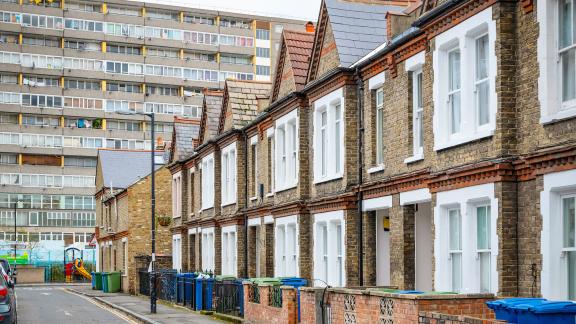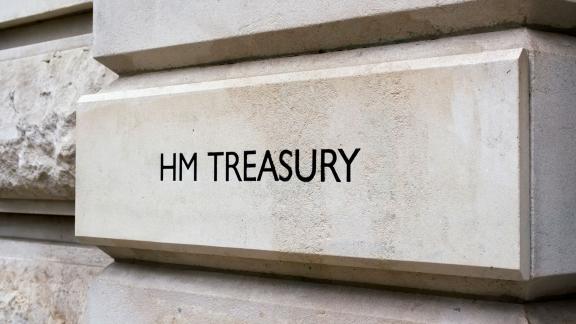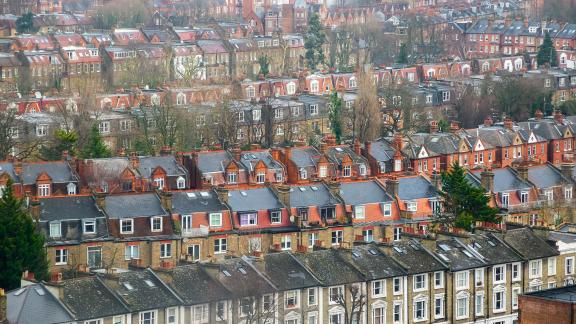Could the energy crisis cause a public health emergency?

Rising energy costs, low incomes and energy inefficient homes may push half of British households into fuel poverty, resulting in cold homes, which cause both physical and mental illness and risk further straining overstretched NHS services.
Key points
- Household energy bills are set to rise to over £4,200 per year from January 2023.
- Even taking into account the £400 cost-of-living rebate promised by the government, this will push over two thirds of UK households into fuel poverty, exacerbating health inequalities that were already widened during the pandemic.
- Healthcare leaders warn that rising rates of fuel poverty will be a public health emergency, causing and exacerbating physical and mental illness across the whole population and further straining already stretched health and care services.
- The public purse already pays for cold homes: the NHS in England spends £1.3 billion each year treating preventable conditions caused by cold, damp homes.
- Fuel poverty, and the health inequalities that it causes, is not inevitable. The mental and physical illnesses caused by living in cold, damp homes are preventable by support from the government that shields households from spikes in fuel prices.
What's happening?
Households are said to be experiencing fuel poverty when they are unable to afford to heat their homes to a reasonable temperature [ 25 ]. There are three key elements that determine the fuel poverty status of a household:
- household income
- household energy requirements
- fuel prices.
In Wales, Scotland and Northern Ireland (and, until recently, England), fuel poverty is defined as spending more than 10 per cent of a household’s income on energy.
New analysis shows that, even accounting for the £400 cost-of-living rebate promised by the government for all UK households, fuel poverty rates in the UK will reach 54 per cent from October, and at least 66 per cent by January 2023, when the energy price cap is estimated to go as high as £4,266 [ 26 ]. To put this in context, in March 2021 the price cap was £1,200.
Healthcare leaders warn that if households are not safeguarded from unaffordable energy price hikes, it will fall to the NHS and social care to pick up the pieces, with increased hospital admissions and demand on GP surgeries, A&E departments and social care services.
Fuel poverty and cold homes exacerbate circulatory, respiratory and mental health problems across all age groups and drive health inequalities. The worsening cost-of-living crisis is not felt equally across society. For the most vulnerable, if not prevented, a cold, damp environment can be deadly.
Recent research by the University of York found that:
- Without further measures, and taking into account the £400 rebate, fuel poverty rates will reach 54 per cent from October and 66 per cent from January.
- By January 2023 over two thirds of households in the UK (18 million) will be in fuel poverty, spending over 10 per cent of net income on fuel.
- There are big regional variations in fuel poverty, ranging from 56 per cent in London to 69 per cent in Wales and 76 per cent in Northern Ireland.
- Over 80 per cent of large families, lone parents and pensioner couples will be in fuel poverty by January 2023 [ 3 ].
The median UK wage is £31,285. The latest estimates suggest that the price cap could go as high as £4,266 in January 2023. This will push households across the UK deep into fuel poverty. By January, just under one third (32 per cent) of all households will be spending more than one fifth (20 per cent) of their net income on energy bills.
The impact of this on households will be devastating. It will force impossible decisions in family budgets, choosing between putting the heating on and going hungry, or trying to raise children in a cold and damp home.
While targeted support for vulnerable groups will also be necessary, these figures show that fuel poverty will become the norm if urgent action is not taken by the government.
The impact on the health and social care system
Fuel poverty exacerbates the risk of poor health outcomes and increases the risk of illness and death across all age groups. The NHS in England spends £1.3 billion each year on treating illnesses caused by cold homes [ 4 ].
Children and adolescents
Growing up in poverty stores up mental and physical health problems that can persist over the whole life course.
Preventing child poverty, and therefore preventing avoidable lifelong illnesses acquired in childhood, is one of the most effective ways to manage demand on the healthcare system.
For example, children growing up in cold, damp homes are more than twice as likely to suffer from respiratory conditions than their classmates in warm homes [ 5 ].
Respiratory conditions such as asthma can require lifelong treatment and often begin in childhood. If a child is diagnosed at the age of six with asthma, they could require as many as 75 years of treatment.
Ensuring that every child has a warm, dry home would drastically reduce the number of children suffering from respiratory illnesses. Not only would this save lives, it would also protect the NHS. Asthma care currently costs the NHS an estimated £1.1 billion per year [ 6 ], so a preventative approach to respiratory health will be crucial to reducing demand on the service.
Conversely, if over half of households in the UK fall into fuel poverty, we can expect to see a drastic uptick in respiratory conditions, undernutrition, and even hospital admissions in children [ 7 ].
Research shows that cold housing is bad for children’s attainment at school, their emotional wellbeing and their resilience
However, it’s not just children’s physical health at risk from cold, damp homes. Research shows that cold housing is bad for children’s attainment at school, their emotional wellbeing and their resilience [ 8 ]. The same is true for teenagers: adolescents living in cold housing are five times more likely to suffer from multiple mental health problems [ 9 ].
Evaluation of historical government programmes in the US, UK and New Zealand aimed at reducing fuel poverty shows such programmes have significant positive mental and physical health benefits for children and young people, ‘especially in terms of infants’ weight gain, hospital admission rates, and caregiver-rated developmental status, as well as self-reported reduction in the severity and frequency of children’s asthmatic symptoms [ 10 ].’
Adults and older people
Older people are also particularly vulnerable to the effects of a cold winter with no heating at home. Because the heart has to work harder to keep the body warm when it’s cold, cold homes increase blood pressure, causing heart attacks and stroke in adults and older people [ 11 ].
In addition, cold homes reduce dexterity, which increases the risk of falls - a common cause of injury, loss of independence and even death for older people [ 12 ]. Falls are estimated to cost the UK £4.4 billion each year, which includes £1.1 billion social care costs [ 13 ].
This comes at a time when the social care sector can ill afford any further increases in demand for its services. In January 2022, two thirds of care home providers had to refuse new requests for home care because staff shortages have drastically reduced capacity in the sector [ 14 ].
The Winter Fuel Payment for pensioners this winter will be £200 for under 80s and £300 for those aged 80 and above. They are also receiving a £300 one-off cost-of-living payment to help with the increased costs of food, housing and other essentials. If the price cap rises to £4,266, this will scarcely pay for two months of energy (£710). In the face of rocketing energy bills, this will not be enough. Pensioner poverty has now reached highs last seen in 2008 [ 15 ].
People living with health conditions or in vulnerable situations
While over half of households will be in fuel poverty next January if action is not taken, this will be particularly tough on those with health conditions or in vulnerable situations.
One such example is people living with kidney disease, who often choose to have dialysis at home. This allows patients to organise their dialysis sessions around their lives, and not the other way around. However, the dialysis equipment incurs high additional energy costs of between £590 and £1,450 each year – costs which were calculated before energy price increases [ 16 ]. Some NHS trusts subsidise these energy costs, but not all can, particularly in the face of spiralling inflation. Applications for Kidney Care UK’s hardship grants rose by 47 per cent last year [ 17 ].
National Voices has also highlighted the struggle to pay bills that people with cancer, Crohn’s and Colitis, kidney disease, mental illnesses, and people in receipt of benefits are currently experiencing [ 18 ].
What are health and care organisations doing to help?
Healthcare system leaders are doing all they can to shield healthcare staff and patients from the worst effects of the cost-of-living crisis. Measures include hardship grants, food banks, and subsidised travel [ 19 ]. Working with multisector partners across integrated care systems, the NHS has a crucial role in developing local strategies to tackle the root causes of poor health, such as fuel poverty. Tackling the ‘causes of the causes’ of ill health reduces demand for healthcare services, because up to 90 per cent per cent of what affects our health comes from the broader determinants of health, such as housing and the conditions in which we live.
Fuel poverty creates a vicious cycle of healthcare need
Measures to shield patients and staff from the effects of fuel poverty help to ensure that GPs and hospital staff are not treating patients and then sending them back to the conditions that caused their physical or mental illness. Fuel poverty creates a vicious cycle of healthcare need. For example, a patient presents at their GP with a chest infection from a mouldy bedroom; the GP treats the chest infection, but the patient goes back to sleeping in the mouldy bedroom, and the chest infection reoccurs. The NHS then treats the symptoms again, but without treating the source, the symptoms will continue to reoccur.
Partners in North Devon are working together to tackle fuel poverty as part of the One Northern Devon (OND) Fuel Poverty Group to coordinate work on identifying and helping patients at most risk of fuel poverty [ 20 ].
West Yorkshire Health and Care Partnership is investing £1 million to help keep people warm this winter, so they can live long, healthy lives. The partnership of NHS, local councils, housing associations and the voluntary, community and social enterprise sector aims to benefit people, through a boost to existing projects such as home insulation, boiler repairs, financial savings and benefits advice and heating grants, with the aim of reducing the health risks linked to poor housing and cold homes [ 21 ].
Preventing a public health emergency
With the cost of living rapidly increasing, families across the UK will be required to make impossible choices, such as heating their homes or going hungry. Widespread fuel poverty will increase the estimated 10,000 annual deaths [ 22 ] associated with cold homes and increase demand on already pressured NHS and social care services. Without government action, healthcare system leaders’ actions will be little more than a sticking plaster.
Healthcare leaders are urging the government to act, so that the rising cost of energy is not passed on to households ... forcing people to make choices that endanger their health and put the NHS under further unsustainable pressure
Fuel poverty and the impacts of rising energy prices are not inevitable. Healthcare leaders are urging the government to act, so that the rising cost of energy is not passed on to households by way of unaffordable bills this winter, forcing people to make choices that endanger their health and put the NHS under further unsustainable pressure.
Support must be targeted at those least able to pay more to heat their homes. This includes pensioners, families and people in receipt of regular benefits such as Universal Credit. We know that over 80 per cent of large families, lone parents and pensioner couples are expected to be in fuel poverty by January 2023.
It is for the government to decide how to support those most at risk this winter, but there are several options recently posited that could be considered. For instance, the Institute for Fiscal Studies has suggested that targeted support could be delivered by updating the benefits payments calculation to reflect the recent surge in inflation [ 23 ] This would be a significant intervention given that the real-terms value of Universal Credit will be around 12-13 per cent lower next winter than pre-pandemic levels and this would directly support the lowest income households.
Another proposal from the IPPR think tank suggests that freezing the energy price cap at its current level, or reducing it further, could both ‘fight inflation and support households [ 24 ].’ The IPPR’s analysis found holding the energy price cap at its current level could reduce inflation by as much as 3.9 percentage points and ‘keep inflation peaking at 9.2 per cent, instead of 13 per cent.’ This expands help to beyond the worst off, given the impact of the energy price rise will be felt by all households this winter.
Longer term, healthcare leaders are calling on the government to support local health and care system leaders to respond to the cost-of-living crisis in a way that considers poverty as a key determinant of health. This could be through financial support to help struggling households improve the heating and insulation of their properties. This would also reduce household carbon emissions. Tackling the root causes of fuel poverty would reduce a significant cause of preventable ill health, alleviating its strain on the NHS and social care services.
Conclusion
This is an avoidable catastrophe
Fuel poverty, and the health inequalities that it causes, is not inevitable. This is an avoidable catastrophe. The mental and physical illnesses caused by living in cold, damp homes are preventable by support from the government that shields households from spikes in fuel prices.
The NHS Confederation is committed to acting on behalf of our members, who have told us of the huge suffering they are seeing in their local communities as a result of the cost-of-living crisis.
Such is the strength of concern, the NHS Confederation, on behalf of NHS leaders across the country, has written a letter to the Chancellor calling for price rises to be limited and for targeted support for those individuals and families most in need, as we approach winter.
If you have any questions about how the cost-of-living crisis affects health, please contact Ruth.Lowe@nhsconfed.org.
Footnotes
- 1. National Energy Action. About National Energy Action, [online] accessed 12 August 2022. https://www.nea.org.uk/who-we-are/about-nea/ ↑
- 2. Lowrey, C (2022), Price cap forecasts for January rise to over £4,200 as wholesale prices surge again and Ofgem revises cap methodology. Cornwall Insight. https://www.cornwall-insight.com/price-cap-forecasts-for-january-rise-to-over-4200-as-wholesale-prices-surge-again-and-ofgem-revises-cap-methodology/ ↑
- 3. Jonathan Bradshaw Blog. Revised estimates of fuel poverty 10 August 2022, [online], accessed 18 August 2022. https://jonathanbradshaw.blogspot.com/2022/08/estimates-of-fuel-poverty-10-august.html ↑
- 4. National Energy Action. About National Energy Action, [online] accessed 12 August 2022. https://www.nea.org.uk/who-we-are/about-nea/ ↑
- 5. Bibby, J (2018), What makes us healthy?. The Health Foundation. https://www.health.org.uk/publications/what-makes-us-healthy ↑
- 6. Asthma and Lunch UK. Asthma UK study estimates that asthma care costs at least £1.1bn per year, [online], 18 August 2022. https://www.asthma.org.uk/about/media/news/asthma-uk-study-1.1bn ↑
- 7. Friends of the Earth and the Marmot Review Team (2011), The health impacts of cold homes and fuel poverty. https://www.instituteofhealthequity.org/resources-reports/the-health-impacts-of-cold-homes-and-fuel-poverty/the-health-impacts-of-cold-homes-and-fuel-poverty.pdf ↑
- 8. Ibid. ↑
- 9. Ibid. ↑
- 10. Ibid. ↑
- 11. Age Watch. Cold Weather Health Risks?, [online], accessed 18 August 2022. https://www.agewatch.net/ageing-why-and-how/cold-weather-health-risks/ ↑
- 12. Friends of the Earth and the Marmot Review Team (2011), The health impacts of cold homes and fuel poverty. https://www.instituteofhealthequity.org/resources-reports/the-health-impacts-of-cold-homes-and-fuel-poverty/the-health-impacts-of-cold-homes-and-fuel-poverty.pdf ↑
- 13. Office for Health Improvement and Disparities. Falls: applying All Our Health, [online], accessed 18 August 2022. https://www.gov.uk/government/publications/falls-applying-all-our-health/falls-applying-all-our-health ↑
- 14. National Care Forum (2022), ‘Just grim, difficult and relentless’. https://www.nationalcareforum.org.uk/ncf-press-releases/just-grim-difficult-and-relentless/ ↑
- 15. National Voices (2022), Behind the Headlines: the unequal impact of the cost of living crisis. https://www.nationalvoices.org.uk/publications/our-publications/behind-headlines-unequal-impact-cost-living-crisis ↑
- 16. Kidney Care UK (2022), The rising costs of living. https://www.kidneycareuk.org/news-and-campaigns/news/rising-costs-living/ ↑
- 17. National Voices (2022), Behind the Headlines: the unequal impact of the cost of living crisis. https://www.nationalvoices.org.uk/publications/our-publications/behind-headlines-unequal-impact-cost-living-crisis ↑
- 18. Ibid ↑
- 19. Campbell, D (2022), NHS trusts in England offer staff hardship grants amid cost of living crisis. The Guardian. https://www.theguardian.com/society/2022/aug/11/nhs-trusts-in-england-offer-staff-hardship-grants-amid-cost-of-living-crisis ↑
- 20. The Integrated Care System for Devon (2022), Partners in North Devon tackle fuel poverty. https://www.icsdevon.co.uk/partners-in-north-devon-tackle-fuel-poverty/ ↑
- 21. West Yorkshire Health and Care Partnership. Partnership invests £1million to help keep thousands of people warm, [online], accessed 18 August 2022. https://www.wypartnership.co.uk/news-and-blog/news/partnership-invests-1million-help-keep-thousands-people-warm ↑
- 22. National Energy Action. About National Energy Action, [online] accessed 12 August 2022. https://www.nea.org.uk/who-we-are/about-nea/ ↑
- 23. Johnson, P et al (2022). The long squeeze: rising inflation and the current government support package. The Institute for Fiscal Studies. https://ifs.org.uk/publications/16150 ↑
- 24. Jung, C et al (2022), Freezing the energy price cap could fight inflation and support households. IPPR. https://www.ippr.org/blog/freezing-the-energy-price-cap-could-fight-inflation-and-support-households ↑
- 25. National Energy Action. About National Energy Action, [online] accessed 12 August 2022. https://www.nea.org.uk/who-we-are/about-nea/ ↑
- 26. Lowrey, C (2022), Price cap forecasts for January rise to over £4,200 as wholesale prices surge again and Ofgem revises cap methodology. Cornwall Insight. https://www.cornwall-insight.com/price-cap-forecasts-for-january-rise-to-over-4200-as-wholesale-prices-surge-again-and-ofgem-revises-cap-methodology/ ↑



